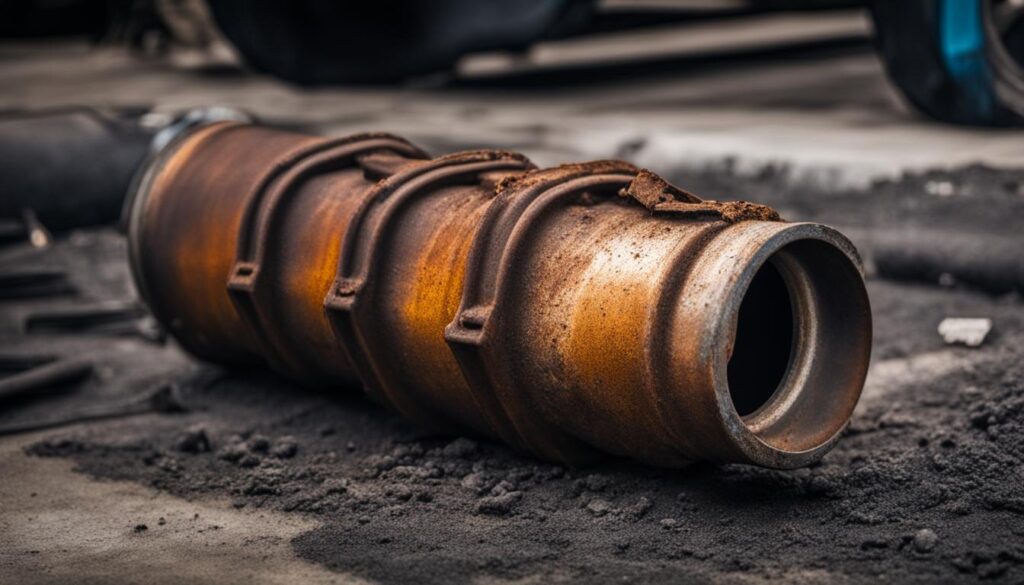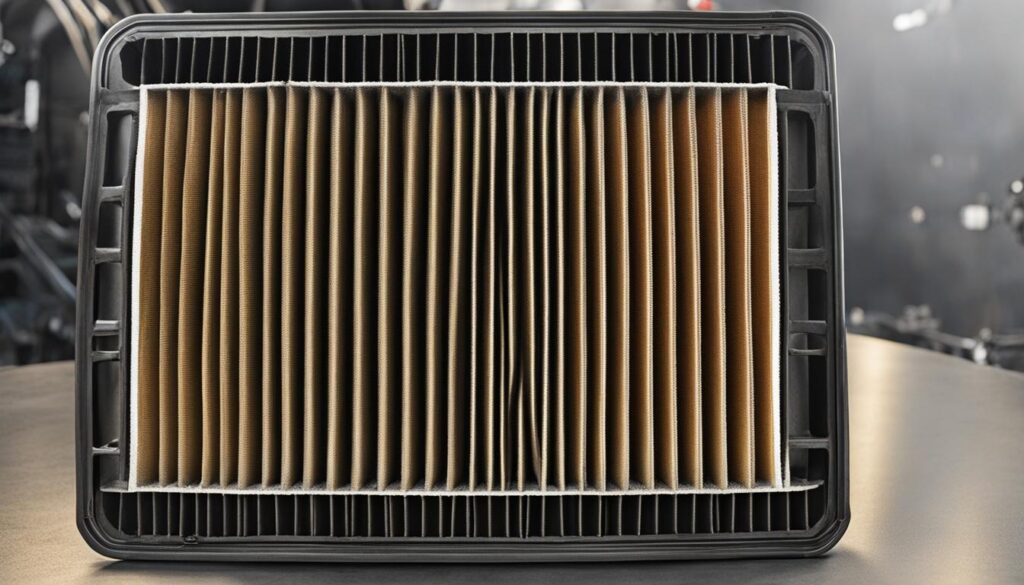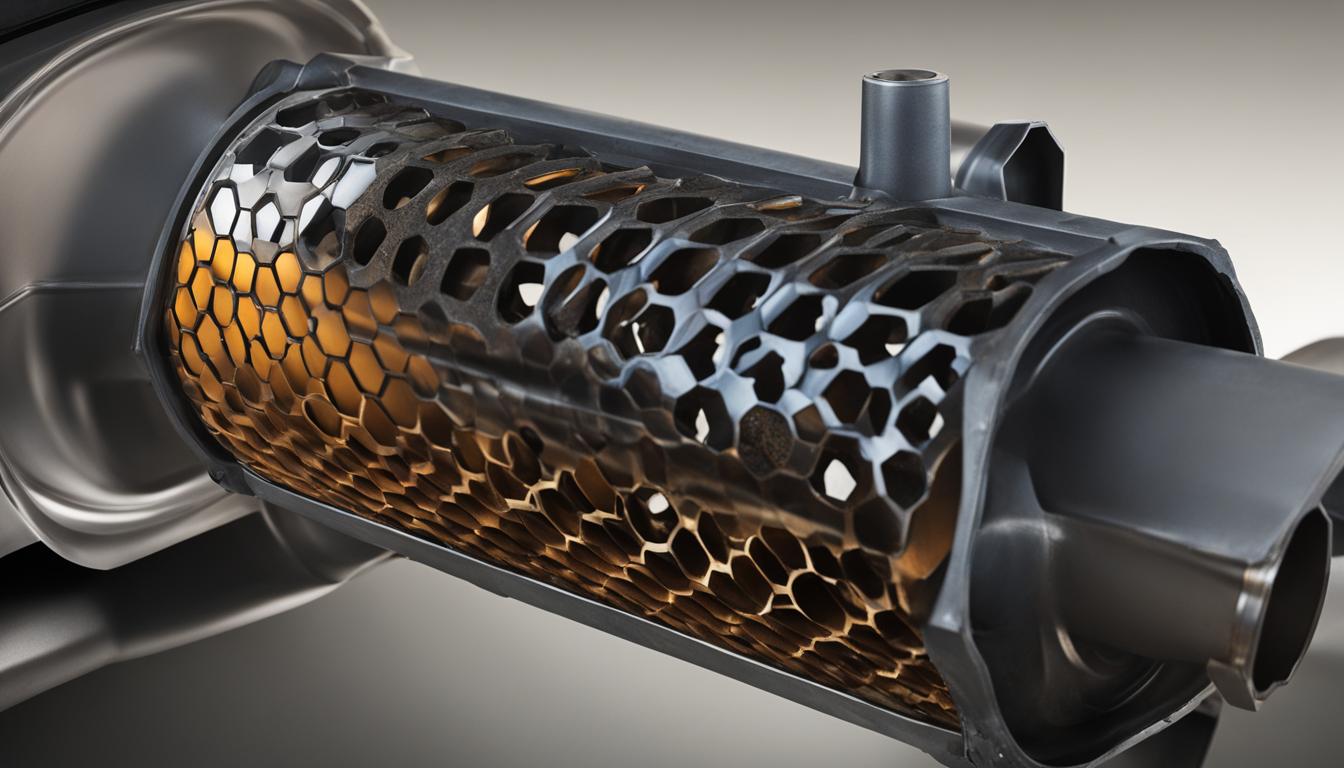A catalytic converter is an important component of a vehicle’s emissions system, responsible for reducing harmful pollutants before they are released into the environment. If you’re wondering how long these crucial devices typically last, we’ve got the answers for you.
The average lifespan of a catalytic converter is around 100,000 miles (160,934 kilometers). However, it’s important to note that this can vary depending on several factors. Factors such as the make and model of the car, the quality of the converter, driving conditions, engine health, and fuel type can all impact the lifespan of a catalytic converter.
Key Takeaways:
- A catalytic converter should last for approximately 100,000 miles.
- The lifespan can be influenced by factors such as the vehicle’s make and model, the quality of the converter, driving conditions, engine health, and fuel type.
- Monitoring the performance of your catalytic converter is important to catch any potential issues.
- Regular maintenance and care can help extend the lifespan of catalytic converters.
- If you notice signs of a failing converter, such as decreased engine performance or unusual smells, it’s crucial to have it checked by a professional mechanic.
Signs of a Failing Catalytic Converter
A failing catalytic converter can lead to a range of issues with your vehicle’s performance. By recognizing the signs of a failing converter, you can address the problem promptly and avoid further damage or costly repairs. Here are some common signs to watch out for:
- Decreased engine performance: If you notice a decrease in power or acceleration, it could be a sign that your catalytic converter is not functioning properly.
- Increased fuel consumption: A failing converter can cause your vehicle to consume more fuel than usual. If you find yourself making more frequent trips to the gas station, it may be time to have your converter checked.
- Reduced acceleration: Difficulty in getting your vehicle up to speed or experiencing a lack of responsiveness when pressing the accelerator pedal can indicate a failing catalytic converter.
- Unusual smells: A strong smell of sulfur or rotten eggs coming from your exhaust could be a sign that your converter is not effectively converting harmful emissions.
- Check engine light: If your check engine light turns on and stays on, it’s important to have your vehicle inspected by a mechanic to determine the cause, which could potentially be a failing catalytic converter.
If you notice any of these signs, it’s crucial to have your car checked by a professional mechanic. Ignoring a failing catalytic converter can lead to further damage to your vehicle and may even result in the need for a complete replacement.
“A failing catalytic converter can have a significant impact on your vehicle’s performance and fuel efficiency. It’s important to address any issues promptly to avoid further damage and costly repairs.” – Mechanic John Smith
To help ensure the longevity of your catalytic converter, it’s important to follow some maintenance tips:
- Get regular tune-ups: Regular maintenance, including tune-ups, can help keep your engine running smoothly and reduce the chances of a failing converter.
- Replace the air filter regularly: A clogged air filter can affect the performance of your engine and put additional strain on your catalytic converter. Make sure to replace the air filter according to your vehicle’s recommended maintenance schedule.
- Use the correct fuel: Using the recommended fuel for your vehicle can help prevent damage to your converter. Consult your vehicle’s manual or speak to a mechanic to ensure you’re using the right type of fuel.
- Avoid driving through deep water or off-road: Driving through deep water or off-road conditions can expose your catalytic converter to potential damage, reducing its lifespan. Try to avoid such situations whenever possible.
By keeping an eye out for signs of a failing catalytic converter and following these maintenance tips, you can help extend the life of your converter and ensure optimal performance from your vehicle.

Factors Affecting the Lifespan of Catalytic Converters
Understanding the factors that influence the lifespan of catalytic converters is crucial in ensuring their optimal performance and longevity. Several key factors can impact how long a catalytic converter will last in your vehicle.
- Driving habits: Your driving habits play a significant role in the lifespan of your catalytic converter. Frequent short trips and driving at high speeds can put extra stress on the converter, potentially reducing its lifespan.
- Environmental conditions: The environmental conditions in which you drive can also affect the lifespan of your catalytic converter. Areas with high air pollution levels or rough road conditions can accelerate wear and tear, leading to a shorter lifespan.
- Quality of the converter: The quality of the catalytic converter you choose can make a difference in its lifespan. Higher-quality converters are often built to withstand harsh conditions and may last longer than lower-quality alternatives.
Regular maintenance is essential in extending the life of your catalytic converter. By following recommended maintenance schedules, such as regular tune-ups and air filter replacements, you can help keep your converter in optimal condition. Additionally, using the correct fuel and avoiding driving through deep water or off-road can contribute to a longer lifespan for your catalytic converter.
Table: Factors Affecting Catalytic Converter Lifespan
| Factor | Impact |
|---|---|
| Driving habits | Short trips and high-speed driving can reduce lifespan. |
| Environmental conditions | High air pollution and rough roads can accelerate wear and tear. |
| Quality of the converter | Higher-quality converters often have a longer lifespan. |

By understanding and managing these factors, you can help maximize the lifespan of your catalytic converter. Regular maintenance, driving responsibly, and using high-quality converters can all contribute to ensuring optimal performance and reducing the need for premature replacements.
Replacing a Failing Catalytic Converter
If you suspect that your catalytic converter is failing, it’s important to address the issue promptly to avoid further damage to your vehicle and ensure compliance with emissions regulations. Here are some signs that indicate a failing catalytic converter:
- Decreased power and acceleration: A failing converter can cause your vehicle to lose power and struggle when accelerating.
- Increased exhaust fumes: If you notice a strong, unpleasant odor coming from your vehicle’s exhaust, it may be a sign of a failing catalytic converter.
- Decreased fuel efficiency: A failing converter can cause your vehicle to consume more fuel than usual, leading to decreased fuel efficiency.
- Unusual noises: Rattling or ticking noises coming from your converter may indicate internal damage and the need for replacement.
If you experience any of these signs, it is recommended to consult a professional mechanic to accurately diagnose the issue. Replacing a failing catalytic converter can be expensive, but it is necessary to maintain the performance of your vehicle and reduce harmful emissions.
To make catalytic converters last longer, proper maintenance is key. Here are some tips:
- Regular tune-ups: Keeping your engine well-maintained can help prevent issues that may contribute to catalytic converter failure.
- Air filter replacement: A clean air filter ensures proper airflow to the engine and reduces the risk of contaminants reaching the converter.
- Using the correct fuel: Using the recommended type of fuel for your vehicle can minimize the chance of fuel-related damage to the converter.
- Avoiding off-road and deep water driving: Rough roads and water exposure can lead to physical damage to the converter, so it’s best to avoid such conditions when possible.
By following these maintenance tips and promptly addressing any issues, you can help extend the lifespan of your catalytic converter and reduce the need for frequent replacements.
Table: Common Signs of a Failing Catalytic Converter
| Signs of a Failing Catalytic Converter | Possible Causes |
|---|---|
| Decreased power and acceleration | Internal damage or clogging in the converter |
| Increased exhaust fumes | Fuel mixture imbalance or converter overheating |
| Decreased fuel efficiency | Converter inefficiency or fuel system issues |
| Unusual noises | Physical damage or internal component failure |
Remember, regular maintenance and prompt attention to any warning signs are essential for prolonging the life of your catalytic converter and ensuring the optimal performance of your vehicle.

Conclusion
Catalytic converters are an essential component of your vehicle’s emissions system, playing a crucial role in reducing harmful compounds before they are released into the environment. While the lifespan of a catalytic converter can vary depending on various factors, such as driving habits and environmental conditions, most converters should last for at least 100,000 miles.
To ensure the longevity of your catalytic converter, it’s important to be aware of signs of a failing converter and address any issues promptly. Decreased engine performance, increased fuel consumption, reduced acceleration, unusual smells, and the check engine light turning on are all indications that your converter may be failing.
Regular maintenance and proper care are key to extending the lifespan of your catalytic converter. Getting regular tune-ups, replacing the air filter regularly, using the correct fuel, and avoiding driving through deep water or off-road can all contribute to making your converter last longer. By taking these steps, you not only extend the life of your converter but also ensure its optimal performance, benefiting both your vehicle and the environment.
So, remember to prioritize the maintenance of your catalytic converter and address any issues promptly. By doing so, you can maximize its lifespan and contribute to a cleaner and healthier environment for all.
FAQ
How long do catalytic converters last?
A catalytic converter should last the life of the car or truck, which is typically about 100,000 miles (160,934 kilometers). However, several factors can affect its lifespan.
What are the signs of a failing catalytic converter?
Some common signs include decreased engine performance, increased fuel consumption, reduced acceleration, unusual smells (such as sulfur or rotten eggs), and the check engine light turning on.
How can I extend the lifespan of my catalytic converter?
Regular maintenance tips include getting regular tune-ups, replacing the air filter regularly, using the correct fuel, and avoiding driving through deep water or off-road.
What factors can affect the lifespan of a catalytic converter?
Factors such as driving habits, environmental conditions, and the quality of the converter itself can impact its lifespan. Driving habits like frequently driving short distances or at high speeds can shorten the lifespan.
When should a failing catalytic converter be replaced?
If you notice signs like decreased power and acceleration, increased exhaust fumes, decreased fuel efficiency, and unusual noises, it’s time to replace the failing catalytic converter.
